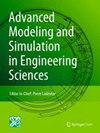Enhanced prediction of thermomechanical systems using machine learning, PCA, and finite element simulation
IF 3.2
Q3 MECHANICS
Advanced Modeling and Simulation in Engineering Sciences
Pub Date : 2024-06-29
DOI:10.1186/s40323-024-00268-0
引用次数: 0
Abstract
This research paper presents a comprehensive methodology for analyzing wet clutches, focusing on their intricate thermomechanical behavior. The study combines advanced encoding techniques, such as Principal Component Analysis (PCA), with metamodeling, to efficiently predict pressure and temperature distributions on friction surfaces. By parametrically varying input parameters and utilizing Finite Element Method (FEM) simulations, we generate a dataset comprising 200 simulations, divided into training and testing sets. Our findings indicate that PCA encoding effectively reduces data dimensionality while preserving essential information. Notably, the study reveals that only a few PCA components are required for accurate encoding: two components for temperature distribution and pressure, and three components for heat flux density. We compare various metamodeling techniques, including Linear Regression, Decision Trees, Random Forest, Support Vector Regression, Gaussian Processes, and Neural Networks. The results underscore the varying performance of these techniques, with Random Forest excelling in mechanical metamodeling and Neural Networks demonstrating superiority in thermal metamodeling.利用机器学习、PCA 和有限元模拟增强热机械系统的预测能力
本研究论文介绍了一种分析湿式离合器的综合方法,重点关注其复杂的热机械行为。该研究将先进的编码技术(如主成分分析 (PCA))与元建模相结合,有效地预测了摩擦表面的压力和温度分布。通过参数化改变输入参数和利用有限元法(FEM)模拟,我们生成了一个由 200 个模拟组成的数据集,分为训练集和测试集。研究结果表明,PCA 编码能有效降低数据维度,同时保留基本信息。值得注意的是,研究表明,只需要几个 PCA 分量就能实现精确编码:温度分布和压力有两个分量,热流密度有三个分量。我们比较了各种元建模技术,包括线性回归、决策树、随机森林、支持向量回归、高斯过程和神经网络。结果凸显了这些技术的不同性能,其中随机森林技术在机械元建模方面表现出色,而神经网络技术则在热元建模方面更胜一筹。
本文章由计算机程序翻译,如有差异,请以英文原文为准。
求助全文
约1分钟内获得全文
求助全文
来源期刊

Advanced Modeling and Simulation in Engineering Sciences
Engineering-Engineering (miscellaneous)
CiteScore
6.80
自引率
0.00%
发文量
22
审稿时长
30 weeks
期刊介绍:
The research topics addressed by Advanced Modeling and Simulation in Engineering Sciences (AMSES) cover the vast domain of the advanced modeling and simulation of materials, processes and structures governed by the laws of mechanics. The emphasis is on advanced and innovative modeling approaches and numerical strategies. The main objective is to describe the actual physics of large mechanical systems with complicated geometries as accurately as possible using complex, highly nonlinear and coupled multiphysics and multiscale models, and then to carry out simulations with these complex models as rapidly as possible. In other words, this research revolves around efficient numerical modeling along with model verification and validation. Therefore, the corresponding papers deal with advanced modeling and simulation, efficient optimization, inverse analysis, data-driven computation and simulation-based control. These challenging issues require multidisciplinary efforts – particularly in modeling, numerical analysis and computer science – which are treated in this journal.
 求助内容:
求助内容: 应助结果提醒方式:
应助结果提醒方式:


